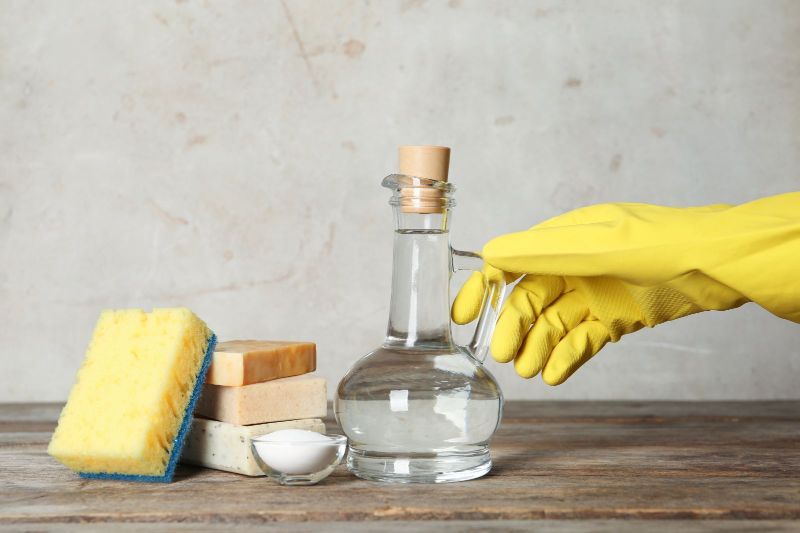Vinegar is a popular household cleaner that is known for its natural and effective cleaning properties. However, despite its benefits, vinegar should not be used in all cleaning situations. In fact, there are certain scenarios where vinegar can actually cause damage or harm. Here are some tips on how NOT to use vinegar when cleaning:
- Don't Use Vinegar on Natural Stone Surfaces
Vinegar is acidic and can damage natural stone surfaces such as marble, granite, and travertine. The acid in vinegar can etch and dull the surface, leaving it permanently damaged. Instead, use a pH-neutral cleaner specifically designed for natural stone surfaces.
- Don't Use Vinegar on Electronic Devices
Vinegar can damage electronic devices such as computers, smartphones, and televisions. The acid in vinegar can corrode and damage the delicate components inside these devices, rendering them unusable. Instead, use a microfiber cloth or screen cleaner specifically designed for electronic devices.
- Don't Use Vinegar on Hardwood Floors
Vinegar can strip the protective finish on hardwood floors, causing them to become dull and damaged over time. Instead, use a cleaner specifically designed for hardwood floors, or a mixture of warm water and mild dish soap.
- Don't Use Vinegar on Cast Iron Cookware
While vinegar can be a great cleaner for many kitchen surfaces, it should not be used on cast iron cookware. The acid in vinegar can strip the seasoning from cast iron, causing it to rust and lose its non-stick properties. Instead, use a mixture of hot water and coarse salt to clean cast iron cookware.
- Don't Use Vinegar on Egg Stains
If you have an egg stain on a surface, avoid using vinegar to clean it up. The acid in vinegar can actually cause the egg proteins to coagulate and make the stain worse. Instead, use a mixture of warm water and mild dish soap to clean up the stain.
- Don't Use Vinegar on Greasy Surfaces
While vinegar can be effective at cutting through grease, it should not be used on all greasy surfaces. For example, vinegar should not be used on greasy stovetops or oven interiors, as it can leave behind a sticky residue. Instead, use a degreaser specifically designed for these surfaces.
- Don't Use Vinegar on Wax or Oil-Based Stains
If you have a wax or oil-based stain on a surface, vinegar should be avoided. The acid in vinegar can cause these types of stains to set and become even more difficult to remove. Instead, use a cleaner specifically designed for these types of stains.
- Don't Use Vinegar on Iron or Brass
Vinegar should not be used on iron or brass surfaces, as it can cause these materials to corrode and become damaged over time. Instead, use a cleaner specifically designed for these surfaces.
- Don't Use Vinegar on Grout
While vinegar can be effective at removing stains from tile surfaces, it should not be used on grout. The acid in vinegar can break down the grout, causing it to become weak and brittle. Instead, use a grout cleaner specifically designed for this purpose.
- Don't Use Vinegar on Stains on Colored Fabrics
Vinegar should be avoided when trying to remove stains on colored fabrics, as it can cause the colors to fade and bleed. Instead, use a stain remover specifically designed for colored fabrics.
While vinegar is a versatile and effective cleaner, it should not be used in all cleaning situations. To avoid damage or harm, it's important to know how NOT to use vinegar when cleaning. Avoid using vinegar on natural stone surfaces, electronic devices, hardwood floors, cast iron cookware, egg stains, greasy surfaces, wax or oil-based stains, iron or brass surfaces, grout, and stains on colored fabrics. Instead, use cleaners specifically designed for these surfaces and stains to avoid causing damage or harm.
It's also important to remember that while vinegar is a natural cleaner, it can still be harmful if ingested in large quantities. Make sure to keep vinegar and other cleaning products out of reach of children and pets, and always follow the instructions on the label.
In addition to knowing how NOT to use vinegar when cleaning, here are some additional tips for using vinegar safely and effectively:
- Dilute vinegar with water. Using undiluted vinegar can be too strong for some surfaces and can cause damage.
- Test on a small, inconspicuous area first. Before using vinegar on a new surface, test it on a small, inconspicuous area to make sure it won't cause damage.
- Don't use vinegar on sensitive skin. Vinegar can be irritating to sensitive skin, so avoid using it as a skincare product.
- Store vinegar properly. Keep vinegar in a cool, dark place away from direct sunlight to prevent it from losing its cleaning properties.
By following these tips and knowing how NOT to use vinegar when cleaning, you can safely and effectively use vinegar as a natural cleaner in your home. Just remember to always use caution and follow the instructions on the label to avoid causing damage or harm.

